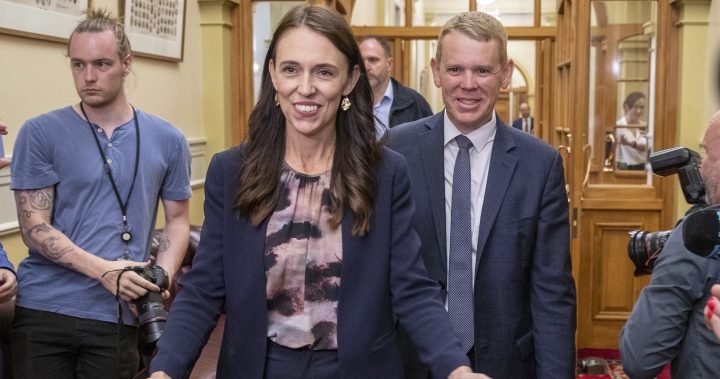What the Ardern, Sturgeon resignations show about the ‘tightrope’ women walk in politics – National | Globalnews.ca
The recent resignations of two prominent world leaders – both women – are raising questions about the “additional” pressures on female politicians and whether enough is being done to remove the hurdles they face.
Last week, Scottish leader Nicola Sturgeon announced she was stepping down after more than eight years in office, as she acknowledged the “physical and mental impact” of the job.
Read more:
Scotland’s Nicola Sturgeon resigns, says ‘physical and mental impact’ of job take toll
Read next:
‘We kind of missed the landing’: Alberta premier on awkward handshake with prime minister
Sturgeon said the brutality of modern politics had taken a toll and she could no longer commit to giving “every ounce of energy” that the job entailed.
Her comments echoed Jacinda Ardern’s who said she had “no more in the tank” when she quit as New Zealand’s prime minister in January.
These recent resignations come as no surprise to Sarah Kaplan, distinguished professor and director of the Institute for Gender and the Economy at the University of Toronto. The COVID-19 pandemic has been an “extraordinarily stressful” time to be a political leader, she said.
“I’m surprised that more leaders have not decided to step down,” she told Global News.

Female politicians – including on women leaders in Canada – are still facing “additional scrutiny and challenges” compared to their male colleagues, which can take a toll.
“Being a woman leader is in a lot of ways more challenging because they’re walking this kind of tightrope between being a woman and being a leader,” said Elizabeth McCallion, a PhD candidate in political studies at Queen’s University.
Because politics is deeply rooted in masculine norms, which include heckling and aggressive behaviour, “it’s not a welcoming environment for women,” she told Global News.
It’s a worrying trend, politicians and political observers say, as women in public roles around the world continue to face backlash, misogyny and personal attacks.
Read more:
‘It’s always there’: Female politicians in Alberta respond to verbal assault on Freeland
Read next:
Liberal MP tops all others with $21.9K spending on ‘protocol gifts.’ Here’s what he spent it on
And while there is a growing representation of women in Canada’s Parliament, with 30 per cent of the House of Commons made up of women – that growth has not come without its challenges.
When former Liberal MP Catherine McKenna took office as Canada’s environment minister in 2015, she said she didn’t know at the time that her political duties related to tackling climate change would also include defending herself as a woman.
It was not long after she became minister, McKenna started facing online harassment and was given the nickname “climate Barbie” because of her blonde hair.
The harassment also moved offline. On one occasion in 2017, someone mailed a Barbie doll to her office.
“It was really … annoying because … I had a big job. And so the idea that I had to also be calling out often or putting up with online hate harassment … was just something I didn’t expect,” she told Global News.

In August last year, Deputy Prime Minister Chrystia Freeland was verbally attacked in Alberta, when a man approached her while she walked into an elevator at city hall in Grande Prairie.
He hurled profanities at her and called her a “traitor,” while a woman joined in and told Freeland “you don’t belong here.”
For Kaplan, the Canadian cases showed “we definitely have a problem in the Canadian context with treating our women leaders with respect.”
Why do women leaders face ‘additional stresses?’
There are “additional stresses” that are placed on women in a male-dominated field such as politics, Kaplan said.
Family is among them, with research suggesting that parenthood and political careers are difficult to balance, particularly for women.
McKenna stepped away from politics in 2021 to spend more time with her children and focus on climate change.
She said it was “really hard” being away from family for long periods of time and she “felt extremely guilty” missing her kids’ events or activities.

Gender norms mean women are more often expected to shoulder the responsibility of child care, which is why it might be harder for women to pursue a political career, said Kaplan.
Read more:
N.S. MLA who recently gave birth can sit virtually, but not before ‘bad message’ sent
Read next:
More Canadians trusting governments as COVID pandemic fades: poll
Laurel Collins gave birth to her daughter, now aged two, during her first term elected as an MP for Victoria, B.C.
The NDP critic for Environment and Climate Change said it would’ve been “impossible” to do her job without the family support, with her mom and partner’s sister both helping out with child care.
“My partner took off 14 months so that he could travel to Ottawa with me and our daughter – and without that, I would have found it impossible,” she told Global News.
NDP MP Laurel Collins rises during Question Period in the House of Commons on Parliament Hill in Ottawa on February 28, 2020.
THE CANADIAN PRESS/Justin Tang
Collins, like McKenna, Freeland and many others, has also faced her share of personal attacks on the job.
In 2020, while talking about sex worker rights in the Parliament, one of her colleagues – a Conservative male MP – asked her if she had considered sex work, Collins recalled.
“Now, this is a question that would never have been asked to a man,” she said.
Collins said Canada has a “long way to go” to address sexism in the political space.
“We have to do more to support women coming into politics and ensure that we’re both removing those barriers and also lifting women up,” she said.
Read more:
Conservative MP forced to apologize after asking NDP MP if she ever ‘considered’ sex work
Read next:
House of Commons marks moment of silence for deadly Laval daycare bus crash
Conservative MP Michelle Rempel Garner has also weighed in on the “additional weight” women in politics have to carry. In a substack post a day after Ardern resigned, she drew comparisons between the kinds of questions some have asked Canadian Prime Minister Justin Trudeau and those put to his New Zealand counterpart.
“Ardern has not attributed any part of her decision to the sexism she faced in politics, so I am reluctant to do it on her behalf,” she wrote.
“Indeed, unlike Ardern, Trudeau hasn’t had to deal with things like being asked if he was going to have babies as a qualifier for his suitability for serving as Prime Minister or being asked if he met with another world leader because of his age and gender.”
She was referring to the time when a journalist asked Ardern and Finland’s Prime Minister Sanna Marin if the purpose for the first-ever visit to New Zealand by a Finnish leader was because they were “similar in age” and that they have a “lot of common stuff.”
“We are meeting because we are prime ministers,” Marin said in response.

After almost two decades working in federal politics including seven of those as a member of Parliament, Conservative MP Karen Vecchio said she has changed the way she addresses misogyny.
“I don’t find that I address it with anger, I address it with solutions – sometimes a little sarcastic, but solutions,” she told Global News.
“What would have bothered me seven years ago, I just react very, very differently now.”
Read more:
Dominique Anglade denounces double standard for women in politics
Read next:
‘We have to move quickly’: Health workers urge premiers to accept Ottawa’s health deal
Vecchio, who is the chair of the Status of Women Committee and the Conservative critic for women and gender equality, said the COVID-19 pandemic has made it especially difficult for women leaders at all levels to balance their work with personal life.
“This is a time, especially for women, where you’re trying to find that balance, especially as a leader, the balance between family and your own personal health and that of your leadership, whether … that of a country or a community like myself,” she said.
“Trying to find that balance is very, very difficult.”

During the COVID-19 pandemic, the House of Commons moved to a hybrid model allowing MPs to attend and participate in debates virtually as long as they are in Canada.
A committee recommended last month that the practice introduced in 2020 become permanent.
Greater representation and allyship could also help keep women from getting “singled out” and facing political attacks, said Kaplan.
“We need the male politicians to be standing up and saying ‘this is not acceptable’ and to be setting the tone themselves in ways that I think they’re not,” she said.
“And I think there’s a lack of appreciation of the difficulty that women leaders face and the necessity for their male counterparts to stand up.”
— with files from Reuters
For all the latest world News Click Here




